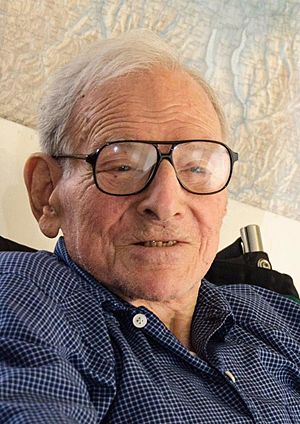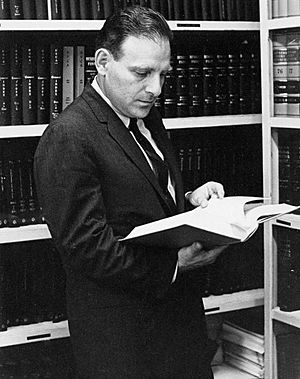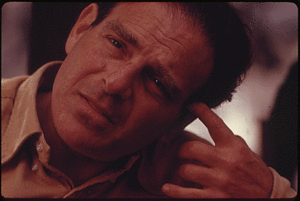David Sive facts for kids
Quick facts for kids
David Sive
|
|
|---|---|

David Sive in 2012
|
|
| Born | September 22, 1922 |
| Died | March 12, 2014 (aged 91) West Orange, New Jersey, U.S.
|
| Alma mater | Brooklyn College (BA) Columbia University (LLB) |
| Occupation | Environmentalist, lawyer, professor |
David Sive (born September 22, 1922 – died March 12, 2014) was an American lawyer and a big champion for the environment. He taught about environmental law and is known as a pioneer in this field in the United States. He helped create many of the environmental laws we have today.
Contents
Early Life and His Love for Nature
David Sive was born in Brooklyn, New York, on September 22, 1922. As a teenager, he fell in love with the outdoors and the American wilderness. He enjoyed reading writers like Henry David Thoreau and Ralph Waldo Emerson. This sparked his lifelong passion for protecting nature and wild places.
During his college years, he went on many hiking and camping trips. He explored the Catskill Mountains and Adirondack Mountains in New York State. These adventures showed his future dedication to keeping New York's wild areas "forever wild." He became a strong voice for environmental protection across the U.S.
Sive finished college at Brooklyn College in 1943, studying political science. He joined the United States Army in 1942 and was called to serve in 1943. He fought in Europe, including the Battle of the Bulge. He was wounded twice and received the Purple Heart medal. After the war, he went to Columbia Law School and became a lawyer in 1948.
Fighting for the Environment as a Lawyer
David Sive became known as a skilled lawyer who fiercely defended the environment. In 1962, he helped start a law firm in New York City. This firm, now called Sive, Paget & Riesel, is still a leader in environmental law today. He also led the Atlantic Chapter of the Sierra Club, a well-known environmental group.
Sive worked on many important cases that helped shape environmental law. One famous case was Scenic Hudson Preservation Conference v. Federal Power Commission in 1971. In this case, Sive argued that a group of citizens could sue even if they didn't have a financial interest in the project. This was a big win because it allowed everyday people to stand up for the environment. The case stopped a large power plant from being built near the Hudson River.
Other key cases he worked on included:
- Committee for Nuclear Responsibility, Inc. v. Schlesinger (1971): This case brought attention to underground nuclear bomb testing and its possible harm to the environment in Amchitka Island, Alaska.
- Citizens Committee for the Hudson River v. Volpe et al. (1970): This case stopped a planned expressway from being built in the Hudson River.
Sharing His Knowledge
David Sive also loved to teach. He taught about environmental law and how to handle lawsuits at Columbia Law School for many years. He was also a visiting professor at several other universities across the U.S.
In 1995, he joined the faculty at Pace University Law School. Today, the Pace Law Library has a special collection of his papers. This collection, called the David Sive Manuscript Collection, helps students and scholars learn more about environmental law.
Environmental Organizations
Sive was a very active leader in many environmental groups. He helped start the Natural Resources Defense Council, which is a top public interest law firm focused on the environment. He also helped create the Environmental Law Institute.
He was involved with the Sierra Club when the government tried to take away its tax-exempt status in 1966. This unexpected event actually made the Sierra Club much more famous and helped it gain many new members. Sive later served on the Sierra Club's Board of Directors.
He also helped found Environmental Advocates of New York and Friends of the Earth. He was a board member for groups like the Hudson Valley Institute and Scenic Hudson. He truly dedicated his life to protecting our planet.
Awards and Recognition
David Sive received many awards for his important work. These awards came from groups like the Environmental Law Institute, the Sierra Club, and the Natural Resources Defense Council. He also wrote many articles and gave many talks about environmental law and how to fight for it in court.
 | Janet Taylor Pickett |
 | Synthia Saint James |
 | Howardena Pindell |
 | Faith Ringgold |



